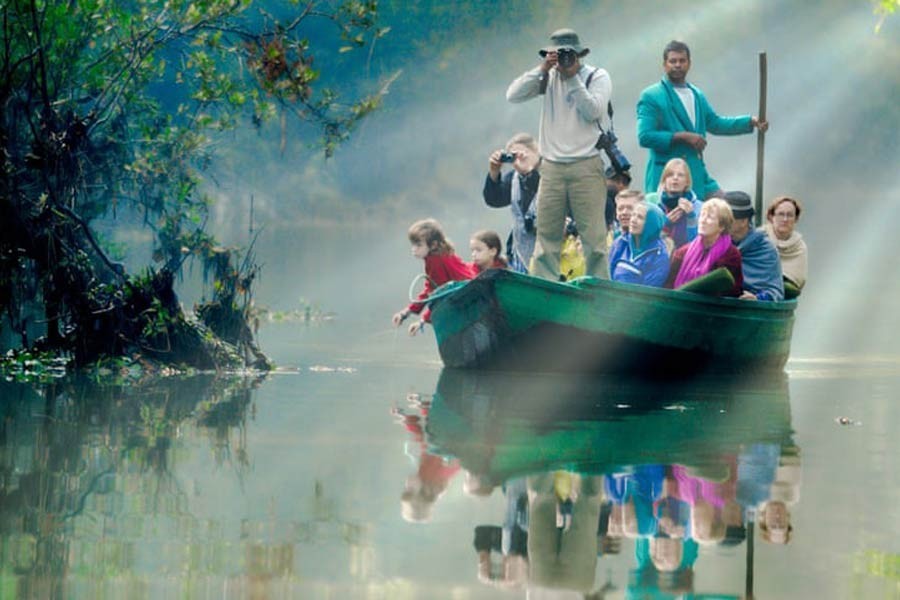The frenzy over touring the country's popular spots continues to reach a crescendo. To the conscious segments of people, the situation is alarming; to say the least. The tourists might be unaware of the deadly fun they are now indulging in. The tour fever has started since the word of the remission in the intensity of the Covid-19 prevalence. Few have felt the need for checking on the real situation. They have little idea that by setting out for an already crowded beach or a popular tourist island amid a festering pandemic, they are, in fact inviting hazards for themselves.
Experts are trying to find out as to how the tourists could become so convinced of a post-pandemic hazard-free situation. But then, when it comes to the people of Bangladesh, they do not care a fig about what health authorities say about hygiene and disease controls. Moreover, many of the people now crowding the Cox's Bazar, Patenga and Kuakata beaches presumably do not read newspapers regularly. They are, thus, unaware of the resurgence of Covid-19 in Bangladesh. On the other hand, lots of people feel encouraged to visit the beaches after watching the TV grabs of the revelling beach-going people. In short, the pandemic-time tours have lately reached a dreadful level in the country. With the people in general flouting the government-enforced health guidelines, the situation is feared to revert to its earlier dreadfulness. Last time, the government tried to cope with the situation by imposing a 'shutdown', restricting the movement of people on roads. In was accompanied by the compulsory wearing of masks while on foot. Tours remained banned in the beginning phase of the pandemic. All tourist spots were declared shut. In the phase of the pandemic's resurgence different types of troubling scenes dominate the whole spectacle. A common feature stands out among these sights: an anathema for maintaining health protocols, the premier of them being wearing of masks and maintaining physical distance.
The scenes of hysteric tourists jostling with one other or idling on the beaches, many frolicking at hilly streams in the other tourist sites point to a self-invented reverie: the country is now free of the pandemic. Their belief may have been strengthened by the people rushing to vaccination centres to have them inoculated against Covid-19. The irony is many tourists are least bothered about being vaccinated. They might be thinking large numbers of people getting vaccinated across the country would weaken the ferocity of the pandemic.
These wishful thoughts and the following mindless activities are feared to snowball into a nightmare. The initial stage of it may witness people in large numbers transmitting the virus and getting infected. After all, from presidents and prime ministers, the kings and queens and the royals to the business tycoons --- few are spared by Covid-19. At the mundane level, those who do not break away from their devil-may-care lifestyle can hardly escape the pandemic's wrath. The present situation in Bangladesh regarding Covid-19 is one filled with both ignorance and wilful defiance. Developments like this prompt the authorities to go tough. It's because the noncompliance of a few small communities with health guidelines, like physical distance, puts the majority to hazards like being in the path of the ongoing pandemic. At one point of time, the governments bound by constitution to stand by people in their times of distress find themselves with only one option --- application of the extreme measure. In the times of the resurgent pandemic of Covid-19, the Bangladesh administration may have no other options before them except enforcing a 'complete lockdown'.
The Bangladesh situation is unique on many counts. At times, the focus finds itself limited to no single area. Thus the crowded tourist spots eventually fade out in the face of the emergence of other areas of human assemblages. Those spots remain blatantly exposed in the big cities like Dhaka. To many middle and lower-middle class people, the earlier shutdown was a period of staying home as if on a months-long holiday. Storerooms were filled with food items like rice, pulses or potatoes. Going out on the roads without convincing reasons, however, came under prohibition. Plying the roads was off-limits to public transports like buses, taxis etc. Private cars were largely banned. These moderate restrictive measures, in fact, helped create the holidaying mood at the average middle-class homes. It was the people dependent on their daily income who bore the brunt of the shutdown.
In fact, all the urban areas, including Dhaka, nowadays appear to be carousing spots for various strains of the Covid-19 virus. Due to their movement in a sprawling area, people's congestion doesn't become prominent. The presence of large numbers of people milling around within narrow confines emerges with all its pandemic-time dreads. A highly troubling feature singling out the tourist spot-centred people is they might be, unwittingly, transmitting the pandemic virus to the vulnerable. The new carriers eventually take the viral scourge to their acquaintances back in their neighbourhoods. On being infected after the incubation period, these groups help in the spread of the virus among large segments of people in different areas. Apart from crowded tourist spots, congested marketplaces also spread the pandemic in almost the same manner. There are fears of the authorities clamping down on the crowded tourist spots --- leading to fresh closures. It may or may not have links to Dhaka being under a lockdown. Tourism hit by pandemic-time intermittent closures has already become a global new normal.


